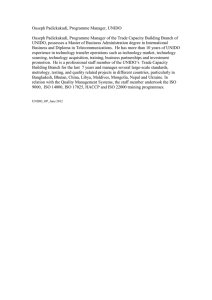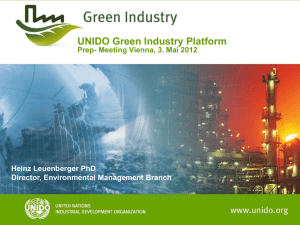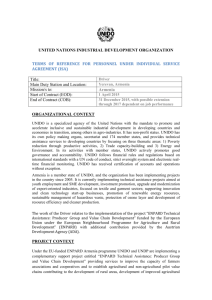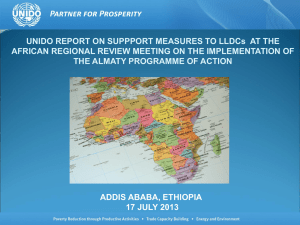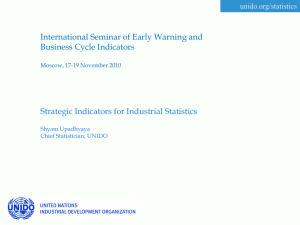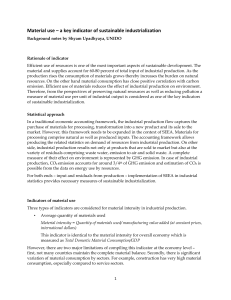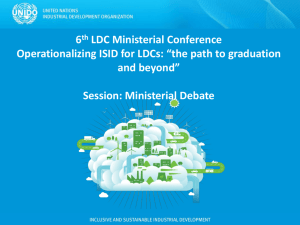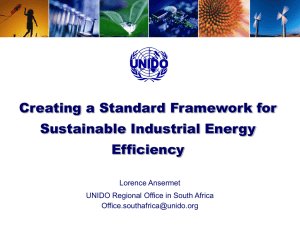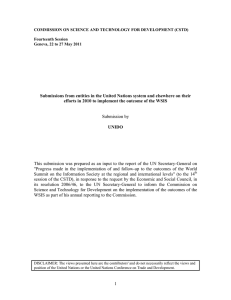Document 10395204
advertisement
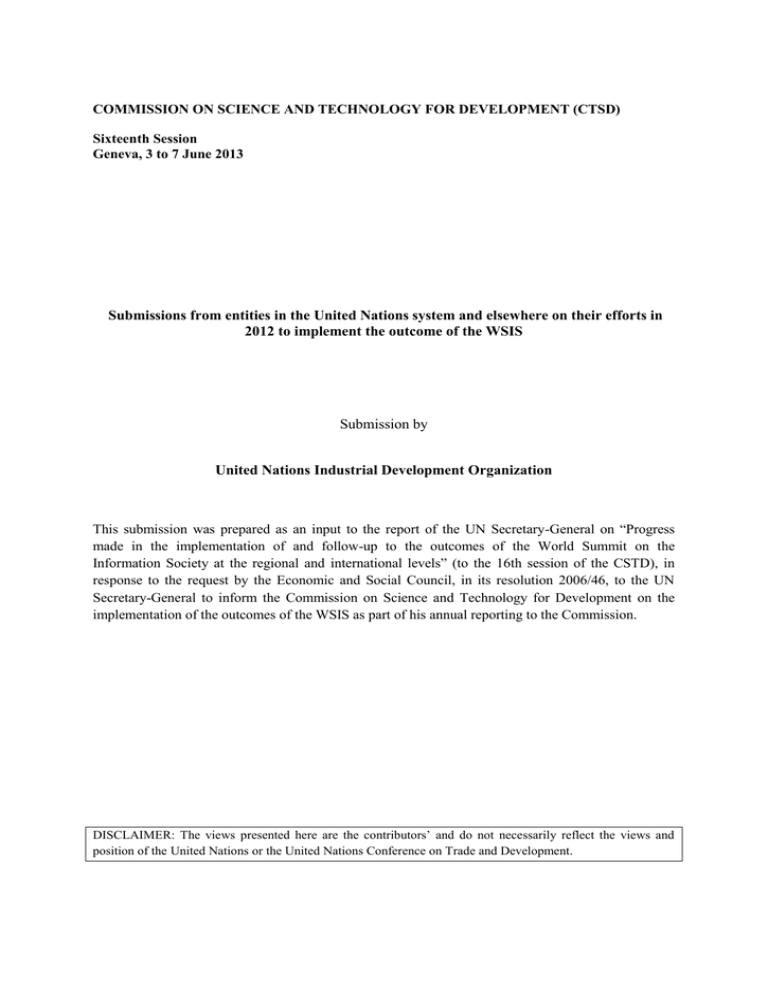
COMMISSION ON SCIENCE AND TECHNOLOGY FOR DEVELOPMENT (CTSD) Sixteenth Session Geneva, 3 to 7 June 2013 Submissions from entities in the United Nations system and elsewhere on their efforts in 2012 to implement the outcome of the WSIS Submission by United Nations Industrial Development Organization This submission was prepared as an input to the report of the UN Secretary-General on “Progress made in the implementation of and follow-up to the outcomes of the World Summit on the Information Society at the regional and international levels” (to the 16th session of the CSTD), in response to the request by the Economic and Social Council, in its resolution 2006/46, to the UN Secretary-General to inform the Commission on Science and Technology for Development on the implementation of the outcomes of the WSIS as part of his annual reporting to the Commission. DISCLAIMER: The views presented here are the contributors’ and do not necessarily reflect the views and position of the United Nations or the United Nations Conference on Trade and Development. 2012 UNIDO Contribution to the Annual Report of the Secretary General to the CSTD, 16th Annual Session Executive summary In 2012, UNIDO continued to assist its Member States and the global community with the implementation of ICT applications (C7) that support sustainable and inclusive industrial development. These initiatives were in the fields of E-environment, E-Government, and Elearning. Furthermore, in 2012, the “Connectedness Index” developed under UNIDO’s Networks for Prosperity Initiative(N4P) was expanded to cover data for 132 countries (C4). (C7) ICT Applications E-environment UNIDO, in collaboration with UNEP, launched the Green Industry Platform1 at the United Nations Conference on Sustainable Development (Rio+20) in June 2012. The Green Industry Platform is a global, high-level, multi-stakeholder partnership and forum to catalyze, mobilize and mainstream action on Green Industry around the world. It provides a framework for bringing governmental, business and civil society leaders together to secure concrete commitments and action in support of the Green Industry agenda, i.e. greening the manufacturing process and creating green industries for production of goods and services for domestic use or export. By encouraging the more efficient use of energy and raw materials in manufacturing processes and services, the Platform will contribute both to cleaner and more competitive industrial development, and will help reduce pollution and reliance on unsustainable use of natural resources. E-government UNIDO assisted the Government of the Socialist Republic of Viet Nam in implementing the on-line business and tax registration system, National Business Registration System (NBRS)2, throughout all 63 provinces in the country. In 2012, regulatory reform, institutional collaboration and on-line collaboration through extensive use of ICT between four Ministries, 65 business registration offices and 65 tax offices resulted in significantly decreasing the costs and risks of doing business in Viet Nam; with registration of legal business entities decreasing to less than 5 days from 15 days. The central, national business registry contained over 740,000 entities as of December 2012 and will be opened to on-line public enquiries and full on-line registration in January 2013. 1 http://www.greenindustryplatform.org 2 http://www.un.org.vn/en/publications/publications-by-agency/doc_details/302-business-registration-reformin-viet-nam-a-situation-analysis-of-the-reform-and-of-unido-support.html 1 E-learning UNIDO, in collaboration with the HP LIFE programme, launched an online training program called HP LIFE e-Learning3 in November 2012. This innovative, interactive online training programme consists of 14 different training modules and provides an opportunity for aspiring and existing entrepreneurs to learn IT and business skills anywhere, on their own time and at their own pace. The new HP e-Learning program supplements the face-to-face LIFE trainings currently provided through HP LIFE training centers in collaboration with UNIDO. Since 2008, over 50,000 people have been trained through the network of 122 LIFE centers in the 15 countries that UNIDO oversees. (C4) Capacity Building UNIDO’s Networks for Prosperity (N4P) initiative4 aims to inspire new learning and knowledge sharing partnerships for the advancement of economic policymaking and policy implementation in developing countries. More thorough understanding of networks as a specific form of economic governance present opportunities for alleviating or circumventing typical barriers to economic development, including access to knowledge. The global “Connectedness Index” establishes a baseline that could quantify a country’s connectedness with regard to a country’s comparative ability to foster domestic economic linkages and human resource development, as well as its ability to connect internationally, reap the fruits of globalization and participate in global governance networks. In this context, ICTs are often the necessary infrastructure that enables such partnerships to flourish. In 2012, the “Connectedness Index” was expanded to cover data for 132 countries. 3 http://www.unido.org/index.php?id=866 4 http://www.unido.org/index.php?id=1002022 2
